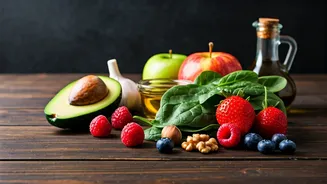Oats: Heart's Best Friend
Oats stand out as a breakfast superstar when it comes to managing cholesterol. They are packed with soluble fiber, specifically beta-glucan, which acts
like a sponge, absorbing cholesterol in the digestive system and preventing its absorption into the bloodstream. A daily serving of oatmeal, about a cup and a half, can help reduce LDL (bad) cholesterol levels by 5–10%. Moreover, oats are incredibly versatile, fitting seamlessly into various meals, from breakfast porridges to baked goods and even savory dishes. Starting your day with oats can set a strong foundation for heart health.
Nuts: A Nutritious Powerhouse
Nuts, especially almonds, walnuts, and cashews, offer a treasure trove of heart-healthy benefits. They are rich in unsaturated fats, fiber, and plant sterols, all of which contribute to lowering LDL cholesterol. Regularly snacking on a handful of nuts is associated with a decreased risk of heart disease. The American Heart Association recommends about 1.5 ounces of nuts per day as part of a balanced diet. Nuts not only improve cholesterol levels but also provide essential nutrients, such as vitamin E and magnesium, which are beneficial for overall health.
Beans: Cholesterol Combatants
Beans, including kidney beans, lentils, and chickpeas, are excellent sources of soluble fiber, which binds to cholesterol in the digestive tract. This prevents cholesterol from being absorbed, effectively lowering LDL levels. Studies suggest that consuming just half a cup of beans daily can lower LDL cholesterol by up to 10%. Beans are also a great source of plant-based protein, making them a nutritious and filling addition to any meal. Their versatility in cuisines worldwide makes it easy to incorporate them into your daily diet, from soups and stews to salads and side dishes.
Fatty Fish: Omega-3 Benefits
Fatty fish, such as salmon, mackerel, and tuna, are packed with omega-3 fatty acids, which not only reduce LDL cholesterol but also increase HDL (good) cholesterol. Omega-3s help to reduce triglycerides, lower blood pressure, and prevent the formation of blood clots. Eating fatty fish at least twice a week is recommended for optimal heart health. The benefits extend beyond cholesterol management, supporting overall cardiovascular well-being. Grilling, baking, or steaming fish are healthy ways to prepare and enjoy these delicious meals.
Avocados: Healthy Fats' Source
Avocados are renowned for their high content of monounsaturated fats, which are beneficial for lowering LDL cholesterol while increasing HDL cholesterol. They also contain fiber and plant sterols, further aiding in cholesterol management. Incorporating avocados into your diet can support heart health and provide a creamy texture and rich flavor to your meals. Whether it's in a salad, spread on toast, or as a dip, avocados offer a tasty and nutritious way to maintain healthy cholesterol levels.
Olive Oil: Heart-Healthy Choice
Olive oil, particularly extra virgin olive oil, is rich in monounsaturated fats and antioxidants. These components help to reduce LDL cholesterol and protect against heart disease. Olive oil is a staple in the Mediterranean diet, known for its heart-healthy benefits. It can be used for cooking, drizzling over salads, or as a finishing touch to many dishes. Switching from butter or other less healthy fats to olive oil can significantly contribute to better cholesterol management and overall cardiovascular health.
Berries: Antioxidant Power
Berries, like blueberries, strawberries, and raspberries, are packed with antioxidants and soluble fiber. These properties help reduce LDL cholesterol and protect the heart from damage. The antioxidants in berries fight inflammation and oxidative stress, both of which contribute to heart disease. Including a cup of berries in your daily diet is an enjoyable and delicious way to boost your heart health. They can be added to breakfast cereals, smoothies, or enjoyed as a healthy snack, providing a burst of flavor and a wealth of health benefits.




















